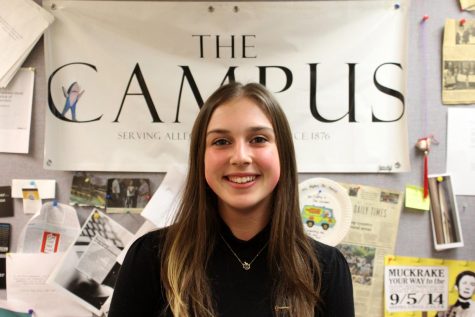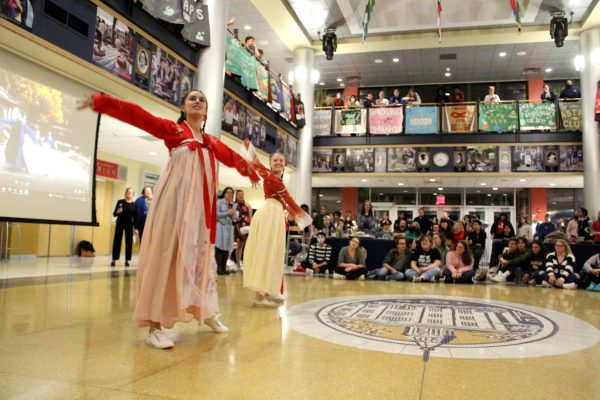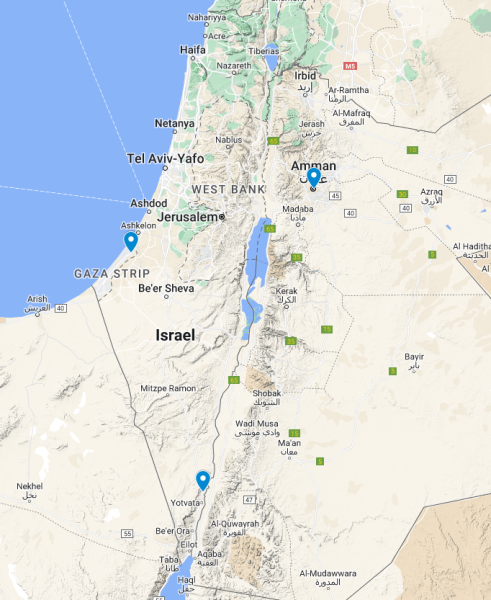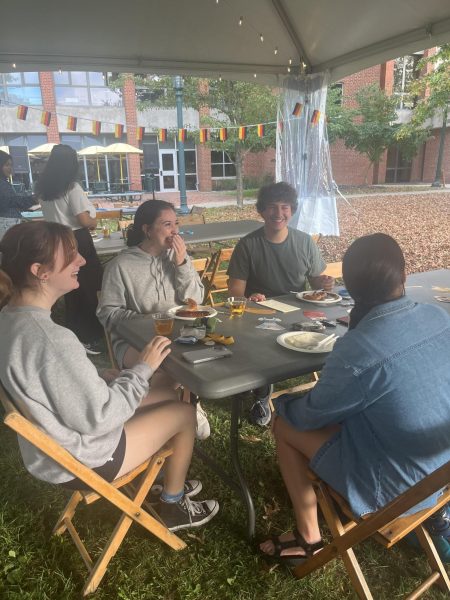Students from Ukraine live and learn in Meadville
This academic year, Allegheny College welcomed five new international students from the National University of Kyiv-Mohyla Academy in Kyiv, Ukraine.
The National University of Kyiv-Mohyla Academy is one of 13 research universities in Ukraine, and is one of the few institutions in Ukraine that award internationally-recognized diplomas, according to Top Universities. It is also one of the smallest universities in Ukraine, with a student population of around 4,000.
Students visiting from Ukraine will attend Allegheny College for one academic year, living and learning on campus while earning credits for their own institution. Students were given the opportunity to travel to one of five other institutions abroad, and had to apply to be accepted into the program.
The COVID-19 pandemic affected academics around the world, and many institutions, including the University of Kyiv-Mohyla and Allegheny College, were forced to switch to online learning.
While students in Ukraine briefly resumed in-person instruction in January 2022, the escalation of the Russo-Ukrainian War in February forced a return to online learning.
“Studying online for three years is not that fun,” Arina Otbliesk, ’24, said.
Otbliesk said that she had always wanted the experience of studying in the U.S., but the beginning of the war and return to online learning reinvigorated her efforts.
Instead of continuing remote learning in Ukraine, students were able to apply for the study abroad program and continue their education elsewhere.
“My story with Allegheny was really interesting,” Mykyta Kovbasa, ’24, said. “I was checking this program everyday if like something new … there was nothing from the U.S.A. It was really like a sign, because I was looking for something in the United States and then (found) Allegheny. Now I’m here.”
While the University of Kyiv-Mohyla and Allegheny College are both considered small in size, there are many other differences that the international students have noticed in their short time in Meadville. Living on campus, as opposed to commuting, is a new experience for many of them.
“For me, living on campus is very comfortable,” Kovbasa said. “Here, it is much easier. All you need is five minutes for me to get from Walker to Quigely. In Ukraine, (the drive to school) takes two hours.”
With cars generally used for more long distance traveling in Ukraine, Kovbasa expressed confusion concerning the amount of students who own a personal car on a pedestrian campus.
“My question is: for what?” he asked.
The students note that Allegheny’s academic programs are a bit different as well.
“In Ukraine, we don’t have minor or major, we have just one,” Kovbasa said. “You have your major and that’s it, but, it’s cool that you guys have (both).”
Despite all of the differences, however, the international students are settling in well.
“I really do like (Allegheny),” Otbliesk said. “It is a beautiful campus, and so nice people here. It’s a culture shock for me, like people who are just saying ‘hi’ to everyone. The American culture is so different from Ukrainian culture. You are too friendly.”
The war in Ukraine has had an obvious impact, not only on academic life but on everyday life as a whole.
“It was like really similar to being depersonalized,” said Sasha Shafran, ’25, about returning to Ukraine this summer. Shafran is attending Allegheny as a full-time international student from Ukraine.
“From the one side, you see the cafes and every table is booked and people are drinking wine in the streets,” Shafran continued. “People are so, so happy, I’ve never seen people as happy as I’ve seen these people. But then the siren goes off.”
Being away from their families and country has been difficult for the students. Though they can learn here in peace, the war in Ukraine is still ongoing.
“I feel safer here,” Kovbasa said. “When I stay with myself in my room, the first thought coming to my mind is, ‘How is my family right now?’ It’s hard to be separate (from your family) always. When it is war, of course, it’s harder.”
However, being overseas and away from their country has done nothing to dampen their Ukrainian pride. Kovbasa ultimately wants his time exploring the world outside Ukraine’s borders to be a catalyst for improving his home.
“My goal is to collect the best experience in the world and to become the best version of myself, and then use this best version to make my country better,” Kovbasa said.
The international students’ love for their country and people is evident in their response to the war at home. The effort to help their country is widespread and heartfelt.
“I opened up a school for children to help manage their panic attacks,” Shafran said. “They didn’t have school the first week of war, and they really needed to be doing something.”
Kovbasa explained how, in a country as small as Ukraine, many feel an extreme sense of pride and patriotism for their country. Especially in a time of such destruction, the youth of Ukraine feel a call to rebuild and improve their homeland.
“A lot of young students going abroad don’t want to stay (abroad). They want to get a degree, a job, get money, get something, and with a new version of themselves, come back to Ukraine,” Kovbasa said. “I want to be a part of this time when everyone will be back in Ukraine. We can share with each other.”

Lottie Mateyak is a senior from Tamaqua, Pennsylvania. She is a Biology major with a Writing minor. This is her first semester working for The Campus as...








